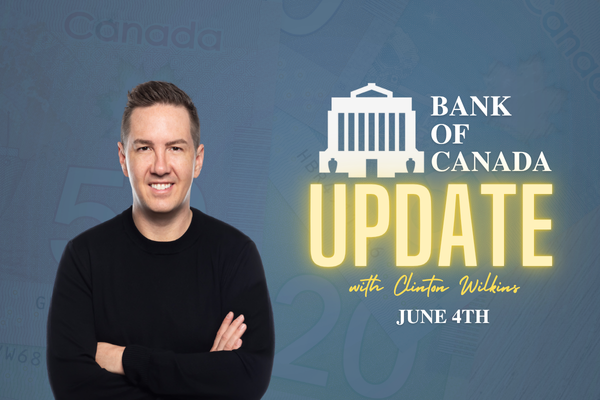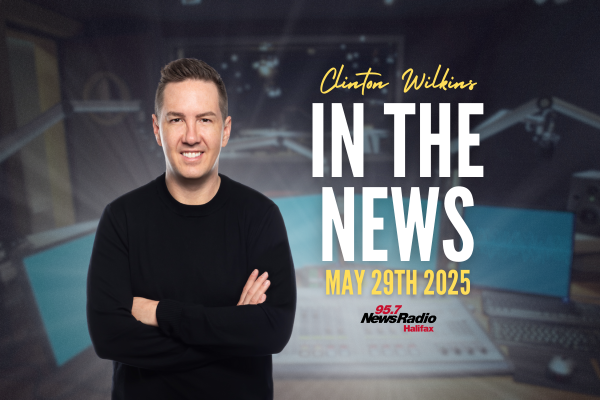Clinton Wilkins joins Todd Veinotte on 95.7 News Radio to discuss The Bank of Canada holding its key policy rate at 2.75%, marking the first pause after seven consecutive cuts.
Rick Howe: Talking about down payments
Talking down payments
Talking About Down Payments. Don’t feel like listening? Check out the audio transcript below.
This is a five minute business builder with Rick Howe, where your business comes first, on News 95.7.
Five-minute business builder with Rick Howe
Rick: [00:00:08] Coming up to 12:23 and from time to time on the show we welcome members of HRM’s business community to tell us more about themselves and the work they do. Today we welcome back mortgage advisor Clinton Wilkins to the studio. Hi Clinton!
Clinton: [00:00:20] Thanks for having me Rick!
Rick: [00:00:20] Well, thank you for joining us here again today and you want to talk to us today about down payments on a mortgage and I guess the first question is how much do we have to have what’s our minimum down payment if we want a mortgage.
What is the minimum down payment?
Clinton: [00:00:32] The minimum down payment in Canada is five percent. Which a lot of people don’t know, a lot of people think that you have to have a bigger down payment these days. There’s been so many rule changes over the last couple of years but homebuyers can use 5 percent down and that doesn’t matter if you’re a first time homebuyer or if you’re a repeat homebuyer minimum down payment five percent.
Rick: [00:00:49] Was it always 5 percent or was it at one time 10 percent was it not?
Clinton: [00:00:52] Years and years ago it would have been 10 percent but for the last number of years, since I’ve been in the industry, for the last 12 years it’s been at least 5 percent down.
Rick: [00:01:00] I’m a little bit older than he is.
Clinton: [00:01:01] That’s alright. I’ll catch up to you one of these days.
How do we save for the down payment?
Rick: [00:01:06] So where do we get the down payment, where do we get the money to provide the down payment what can we use for a down payment.
Clinton: [00:01:11] Down payments typically are from savings accounts or RRSP’s or investments. But more and more people are getting gifted down payments. You know, the Bank of mother, father, brother, sister is a great bank. The gifted down payments are definitely very popular and you can also do a down payment from a borrowed source. Not many people know that you can borrow your down payment off a line of credit or a loan or maybe a credit card, not that you might want to do that. But it is possible you can do something, a borrowed down payment is possible.
Rick: [00:01:41] But when you have only a 5 percent down payment. That means your interest rate is a little higher on the mortgage. Does it not?
How does this impact interest rates?
Clinton: [00:01:47] No you’d actually get a better interest rate with a smaller down payment. In Canada, if you put down 20 percent you can get a conventional mortgage. So that’s a mortgage that doesn’t require Canadian Mortgage and Housing Corporation insurance, Genworth, or Canada guarantee. Any down payment less than 20 percent needs to be insured. Insured mortgages right now are cheaper. So a lower interest rate than a conventional mortgage. Which I think is kind of interesting but I guess the flip side you have to pay an insurance premium to these insurers if you want to go with a smaller down payment. And there’s a certain other nuances that are impacted as well by the down payment. So if you do a down payment that’s less than 20 percent the maximum amortization you can do on the mortgage is 25 years.
Rick: [00:02:29] What is the total amortization? How far can you go if you have a bigger down payment?
Clinton: [00:02:33] So if you do 20 percent down or more you can amortize to a maximum of 30 years.
Rick: [00:02:36] 30 years.
It makes a difference
Clinton: [00:02:36] Yes, so it does make a difference and people always tell me and talk to me about the stress test. You know, really it’s brought into place to try to make the market a little bit more conservative. But I think here in Atlantic Canada we’re conservative already.
Rick: [00:02:50] But we see what’s going on in the states, for example, where they’re adding all kinds of new rules in place in order to try to cool down the housing market.
Clinton: [00:02:58] 100 percent. And we don’t want that in Canada and that’s really why the government has brought in some of these rule changes. But five percent down is definitely doable.
What about zero down mortgages?
Rick: [00:03:05] Is zero down still a possibility?
Clinton: [00:03:08] Great question, So through the credit union networks, and there’s credit unions all over Halifax and Atlanta Canada they do have what we consider a cashback product. So that cashback can be used for the down payment. So we definitely have access to those type of lenders as well. And, Rick, that would definitely be a more expensive product than what would be available through a traditional bank or trust company. The 0 down is definitely more expensive and you end up paying about double the down payment back. So, if they are giving you 5 percent cash back you’re typically paying about 10 percent of that property purchase back over the first five years.
Rick: [00:03:39] What about a bigger down payment? Would that make much difference in the scheme of things?
Clinton: [00:03:43] Well, people asked me if you put down 20 percent we’re going to pay a higher interest rate. Is it worth it? It’s always worth it because you’re not paying that insurance premium. So, if you have access to 20 percent down or more, do it.
Conventional?
Rick: [00:03:53] Well, ok. And mortgage insurance versus a conventional mortgage what does it mean and what’s the better option here for us?
Clinton: [00:04:00] That’s a great question. You know there are certainly lots of pros around having a high ratio or an insured mortgage. You know, it’s protection to the bank which you’re getting a lower interest rate and you’re able to access those lower down payments so you can access the 5 percent down for example. On a conventional mortgage really the big pros are you can have an extended amortization, so you can go up to the 30 year amortization.
As well maybe we can go to a higher percentage of your income that we’re able to use to qualify for that product. As well, if you have a bigger down payment you’re able to access maybe some alternative lending. So for example, if you’re self-employed and we need to do a stated income program, or if you’ve had some credit issues in the past. Maybe 20 percent down is the ticket, and you can get approved.
Rick: [00:04:40] Very much so, very good information indeed. Thank you for joining us here again today Clinton.
Clinton: [00:04:44] Thanks for having me Rick.
Have any questions? Get in touch with us!


